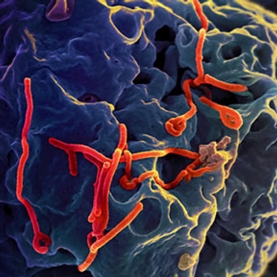You are here
CHEMISTRY WORLD by Christopher Barnard June 17, 215 The virulence of Ebola virus strains appears to be innately linked to the degree of disorder in proteins that form their nucleocapsids. Computational analysis has revealed that strains responsible for the most lethal outbreaks of Ebola show significantly higher levels of intrinsic protein disorder than less virulent strains, in a discovery that could constitute a major breakthrough in understanding the pathogen’s behaviour.
The virulence of Ebola virus strains appears to be innately linked to the degree of disorder in proteins that form their nucleocapsids. Computational analysis has revealed that strains responsible for the most lethal outbreaks of Ebola show significantly higher levels of intrinsic protein disorder than less virulent strains, in a discovery that could constitute a major breakthrough in understanding the pathogen’s behaviour.
With over 27,000 confirmed, probable and suspected cases and more than 11,000 fatalities worldwide, the ongoing Ebola outbreak has resulted in considerably more casualties since late 2013 than all other outbreaks combined. There are no effective treatments or vaccines against the haemorrhagic fever that evinces Ebola infection; however, strains of the virus with drastically different virulence have emerged since the first outbreak in 1976, with fatality rates ranging from 25 to 90%.
In an effort to explain such radical variations in lethality, researchers Gerard Goh, from Goh’s BioComputing in Singapore, Keith Dunker, from the Indiana University School of Medicine in the US, and Vladimir Uversky, from the University of South Florida in the US, have computationally explored links between the virulence of different Ebola virus strains and their predicted protein structures. The group discovered that intrinsically disordered proteins (IDPs) encapsidating the virus’ genetic material appear to play a large role, with increasing levels of disorder correlating with greater virulence.
Read the complete story.
http://www.scientificamerican.com/article/why-some-ebola-strains-are-more-dangerous-than-others/



Recent Comments